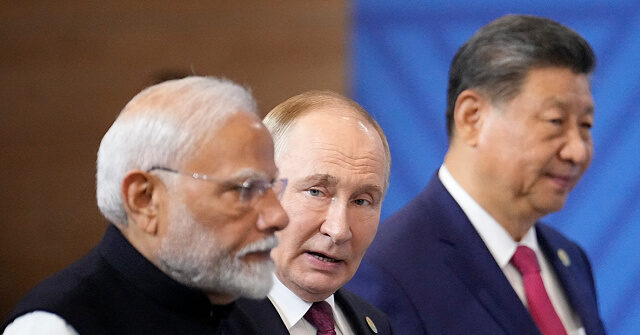At the BRICS summit in Kazan, Russia, President Vladimir Putin capitalized on a pivotal public relations moment, showcasing a united front with Chinese leader Xi Jinping and Indian Prime Minister Narendra Modi. This prominent photo opportunity was meant to illustrate the perceived failure of Western nations to diplomatically and economically isolate Russia following its invasion of Ukraine. During the summit, Putin asserted that over 30 countries have shown interest in joining the BRICS bloc, which originally consisted of Brazil, Russia, India, and China when established in 2009, with South Africa joining a year later. The recent expansion saw Egypt, Iran, Saudi Arabia, the United Arab Emirates (UAE), and Ethiopia become new members in January—a development reflecting the organization’s growing influence.
Putin’s claim of over 30 interested nations signals a significant expansion for BRICS, which has hinted at incorporating 13 additional countries that are keen on collaboration. At the Kazan summit, a notable assembly included representatives from 36 nations, along with U.N. Secretary-General Antonio Guterres. Striking a cautious tone, Putin emphasized the need for balanced consideration of BRICS’ expansion to maintain the group’s effectiveness. He underscored the increasing authority and significance of BRICS in reshaping global dynamics, marking what he described as a shift towards a multipolar world in the face of radical global changes.
Despite stark differences between India and China, both nations demonstrated their continued economic engagement with Russia, particularly in oil procurement. Modi, while more apprehensive about the conflict in Ukraine compared to Xi, refrained from outright condemnation of Russia’s actions, merely voicing hopes for peace during the summit. Observers interpreted Putin’s embrace of Xi and Modi as an illustration of a rising post-American world order. Some analysts speculate that Putin might further emphasize this theme by supporting a peace proposal put forth by Brazil and China, potentially sidelining U.S. and European involvement. However, the Ukrainian government has shown little willingness to accept the proposed framework.
The summit culminated in the “Kazan Declaration,” which criticized Israel for its actions in the Gaza conflict but only briefly referenced Russia’s invasion of Ukraine. This seemingly disproportionate focus led to ridicule from Ukrainian officials, who characterized Russia’s efforts to present the views of the Global South on the Ukrainian crisis as ineffective. Meanwhile, Putin reiterated his calls for developing an alternative payment system within BRICS to reduce reliance on the U.S. dollar, arguing that the dollar’s use as a geopolitical weapon was counterproductive. Notably, he claimed that trade between China and Russia predominantly uses the ruble, indicating an ongoing shift away from dollar dependence, despite past hesitations from members like India regarding complete separation from Western economic frameworks.
The BRICS summit marked a significant geopolitical gathering for Russia amid its ongoing military conflict, serving as a platform for Putin’s agenda and interactions. He held sideline meetings with various heads of state, including Turkish President Recep Tayyip Erdogan and Iranian President Masoud Pezeshkian, both of whom acknowledged the enhanced relations between their nations and Russia. Emphasizing a shared vision, Pezeshkian described the BRICS framework as an effective means for countering U.S.-dominated hegemony and protecting interests associated with Iran, an assertion that resonated with Putin’s goals for establishing a multipolar global order.
However, the diplomatic achievements were accompanied by notable challenges; BRICS representatives encountered significant logistical issues in Kazan, including rolling internet blackouts attributed to signals jamming aimed at thwarting potential Ukrainian drone attacks. Furthermore, the effects of international sanctions on Russia necessitated that attendees carry cash, as credit card transactions faced substantial restrictions. These occasional disruptions underscored the complexities and realities of governance in a nation isolated from several global trade systems, even as Russia and its BRICS partners aim to bolster their position on the world stage.

